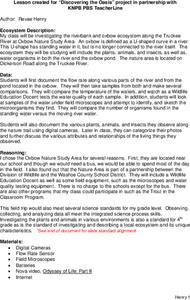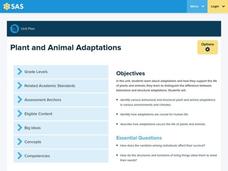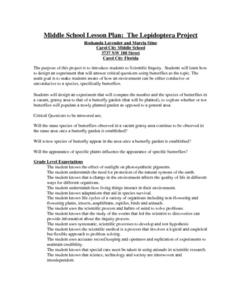Curated OER
Discovering the Oasis
Fourth graders investigate riverbanks and oxbox ecosystem at the Truckee River. They observe the plants, animals, insects and water organisms located there. Students document water samples, flow and then categorize them in class. This...
Curated OER
Science: Putting Down Roots
Fourth graders, in small groups, observe plants and note their characteristics. After drawing pictures of the plants, including their roots systems, they hypothesize in which environments the plants would best thrive. Finally, 4th...
Curated OER
Exploring the Neighborhood -- Literature Jigsaw
Students compare and contrast domesticated animals and wild animals. They identify plants and animals that have adapted to different habitats. They discover it is everyone's responsibility to protect the environment.
Curated OER
Harvesting and Threshing the Seed
Students harvest and thresh the seeds. They count the seeds and compare that number with the original number of seeds planted (8) to determine their profit or loss. Finally, students think about additional questions they have about...
Pennsylvania Department of Education
Plant and Animal Adaptations
Fourth graders identify behavioral and structural adaptations to plant and animal life. In this unit overview, 4th graders discuss the importance of variation and adaptation in a species survival. This is a unit overview and does not...
Curated OER
Brine Shrimp Life Cycle
Second graders investigate the life cycle of the brine shrimp. They use a variety of resources to find the details of each step. Students compare the life cycles of different organisms. They create diagrams of the different stages while...
Curated OER
Mallard's Wet Olympics
Students investigate some of the different characteristics of living things. They make observations from reading and interactive media. Students observe that animals move in different ways and have adaptations to aid in that action.
Curated OER
Lewis and Clark
Ninth graders study the plants and animals Lewis and Clark discovered on their expedition. There is a plant illustrator, a plant recorder, an animal illustrator, and an animal recorder. They research the plants and animals and the ...
Curated OER
De"compost"ition Activity
Students investigate the decomposition process and the parameters which influence the rate at which it occurs. They design a "controlled" experiment by comparing decomposition rates between two compost piles. Analysis questions include...
Curated OER
School Forest Lesson- Looking at Literature
Students compare what they learned though literature to the school forest. In this environment lesson, students visit the forest surrounding their school to listen to literature and identify objects in nature. Students create a display...
Curated OER
Molecular Approaches to Evolution
Students are introduced to working with molecular data. The first activity does both simulated and original data are used to compare amino acid, protein or DNA differences to construct phylogenetic trees or cladograms. These activities...
Curated OER
Learning About Bears And Dolphins
Seventh graders engage in a study that compares the body structures of bears and dolphins. They conduct research to find information and use questions to find the differences or similarities and then conduct a class discussion about the...
Curated OER
Invasive Species
Students explore invasive species. In this species analysis lesson, students observe invasive species and review the impact the species have on the environment. Students work in groups to investigate the species in varying habitats....
Curated OER
Alternative Alphabet
Students determine and compare hieroglyph content and frequency to sentences constructed in an alternative alphabet based on symbols that mimic sounds of the alphabet. They decide which images are hieroglyphs and which ones are not.
Curated OER
Ourselves
Students use a website to name and compare external body parts of humans and other animals.
Curated OER
Terrestrial Communities
Students watch a video about different terrestrial communities. They conduct an experiment with sponges conserving water. They research desert characteristics comparing them with other biomes.
Curated OER
Why Is An Apple Like A Suitcase?
Students examine a variety of fruit to discover that each has seeds. Through experimentation, they discover the role that fruit and seeds play in a plant's life cycle.
Curated OER
Do You See What I See?
Second graders view a teacher-created terrarium, and complete a KWL chart. They discuss what they can see, Students go on a nature walk and compare the schoolyard to the terrarium, discussing the roles of rocks, plants, soil, and water...
Curated OER
But I Need This
Third graders place everything in their desk or back pack onto their desk top. They explain why each item is needed. They receive a set of pictures and write a list of things each person or animal needs to survive. They compare people,...
Curated OER
The Lepidoptera Project
Students are introduced to Scientific Inquiry and discover how to design an experiment that answers critical questions using butterflies as the topic. They design experiments that compare the number of species of butterflies in a vacant,...
Curated OER
Fall Similes
Students create descriptive autumn similes and write them on fall-themed paper. They first write the autumn simile, and then arrange the plants around the border of the paper. They use natural plants which must be pressed.
Curated OER
The Magic School Bus Gets Swamped
Students participate in an experiment that shows them how wetlands filter dirty water. They work in groups to accomplish this experiement with the help of supervisors. A bulletin board can be created to show the plants and animals that...
Curated OER
Classifying Organisms within Kingdoms
Students examine animal kingdom classifications. They discuss how animals are placed into kingdom classifications and compare similarities and differences of animals within a kingdom.
Curated OER
Tall Grass Prairies of Arkansas
Students compare maps depicting the past and present range of tall grass prairie in Arkansas. They research to discover what has happened to the prairie, why it is unique, how it contributes to the biodiversity of Arkansas, and why...

























